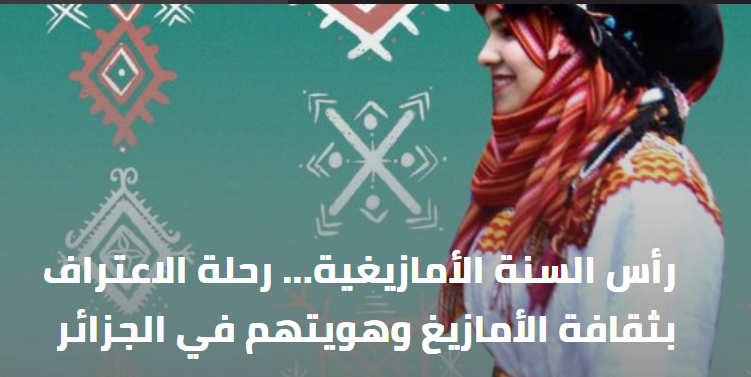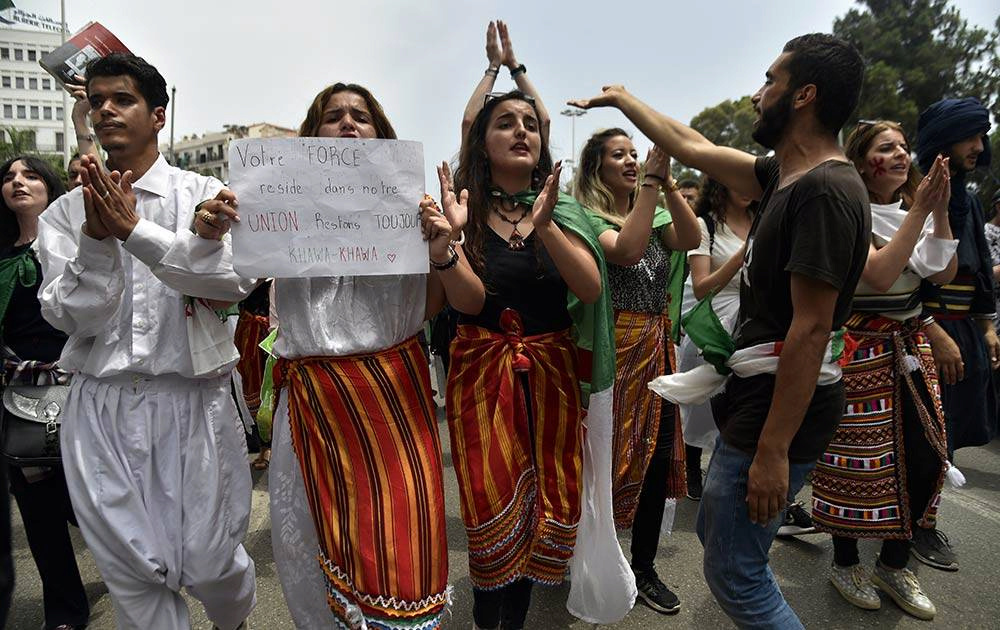Amazigh New Year... The journey of recognizing the Amazigh culture and identity in Algeria

The Amazigh issue has known different stages, between bloody revolutions and political struggle, the beginning of which was demands orbiting the Amazigh language after its exclusion in front of the Arabic language, which has spread since the advent of Islam. After that, the demands developed into imposing recognition of the Amazigh culture, and resisting the obliteration of the Amazigh elements and identity, before adopting associations and organizations laying the foundations for the demarcation of the Amazigh New Year, and making it a national holiday, and a paid day for workers, in which cultural activities are held to celebrate the Amazigh identity.
January 12 is the day the Amazighs celebrate the Amazigh New Year of the year 2,972, and it is called January, which is the year that precedes the Gregorian calendar by 950 years.
This national holiday, which was demarcated by the government of ousted President Abdelaziz Bouteflika, is tantamount to a victory for those we can say are the indigenous people of several regions in Algeria, as they date back to at least the era of the Roman Empire. They have remained there since that time, and still maintain their language, identity, different culture, customs and traditions.

Symbolism of the celebration of yanaier (January 12)
Historians are divided on the origin of the celebration of the Amazigh New Year into two parts. Some of them believe that choosing this date from January symbolizes the peasants’ celebrations of land and agriculture, which made it known as the Peasant Year.
The second section of historians believes that this day in January is the anniversary of the victory of the Amazigh king "Shashnaq" over the Egyptian pharaoh "Ramses II" in Egypt in the battle that took place on the banks of the Nile in the year 950 BC.
In Algeria, for example, celebrants roam residential neighborhoods on January 12 (New Year), wearing masks on their faces, and releasing chants accompanied by traditional dances as part of an annual traditional carnival called "Erad".
The Amazigh issue has known different stages, between bloody revolutions and a political struggle, the beginning of which was the demands of the Amazigh language after its exclusion in front of the Arabic language. After that, the demands evolved into imposing recognition of the Amazigh culture, and resisting the obliteration of the Amazigh elements and identity.
The celebrations also include various academic activities and lectures aimed at introducing the Amazigh civilization and its history, and also discussing issues related to the Amazighs, their concerns, their culture and their place in their societies.
Since 2016, the Algerian authorities have adopted January 12 of each year as an official holiday to celebrate the Amazigh New Year.
Celebrating the feast on this day wear new clothes, cook special dishes, and sometimes shave their heads.
The "Black Spring"... sacrifices to recognize the Amazigh identity
Masinissa, a resident of the city of Kabylie, told that twenty years ago, a bloody protest revolution called the "Black Spring" broke out in the Kabylie region in Algeria, after the death of a high school student in front of a headquarters of the National Gendarmerie in the same state, followed by Riots suppressed by the regime by force. A revolution whose title was to defend the Amazigh identity in a region considered the pioneer of street protest.

Masinissa adds that the protests were preceded by the killing of the student, which came after a quarrel between young men and the gendarmes, as a result of which, on April 18, a young man was seriously wounded by a Kalashnikov machine gun at the gendarmerie headquarters in Beni Douala, a mountainous town near Tizi Ouzou, east of the city. aljeria. Two days later, he died in a hospital in the capital, where he was taken in critical condition, and the high school student was arrested after a quarrel.
It is noteworthy that the incident coincided with the preparations for the celebration of the twenty-first anniversary of the "Amazigh Spring", on April 20, 1980, with demonstrations in support of the recognition of the Amazigh culture, so they rose up after the funeral of the young man.
As a result, residents of cities and villages took to the streets to demand the closure of all National Gendarmerie headquarters in the region, and the demonstrations turned into confrontations with the security forces, who fired live ammunition, killing 126 people and wounding more than five thousand others.

Masinissa continues, "These sacrifices were an explicit starting point for recognizing the Amazigh culture. After the protest revolution, we as Amazighs did not become discouraged, because we believed in a cause, and after that we reached our goals of recognizing our identity and culture and demarcating our language."
A year after these events, the Algerian parliament adopted, by an overwhelming majority, a constitutional review stipulating that Tamazight be considered the “national and official language” in the country, while the Arabic language is the national and official language at the initiative of the ousted president, Abdelaziz Bouteflika.
And the state media began to provide detailed bulletins in Tamazight, since 2002, a year after the bloody events of the "Black Spring".

The Amazigh flag... and the arrest of its bearers
During the popular movement two years ago, the former commander of the People's National Army issued orders to prevent carrying it in Friday rallies, which led to a great state of congestion among the demonstrators, who were raising national flags and the banners of the Amazigh identity that express the origins that do not prejudice unity. Patriotism, or aims for secession, as is the case with the “tribal independence movement,” whose banner symbolizes a group of separatists, most of whom are active in the Kabylie region, which is the stronghold of the Amazighs in Algeria.
And after raising the challenge by the Amazigh youth, during the popular movement marches, after they denounced the decision to prevent the raising of the Amazigh flag, they came out with banners expressing their right to be proud of their culture and identity, and the Algerian authorities announced as a result that 17 people were placed in temporary detention, for raising a flag other than the flag Patriotism, after the Friday rally that followed the speech of the former Chief of Staff, and the banner-carriers were charged with “insulting a statutory body.”
It is noteworthy that Lieutenant General Ahmed Kaid Saleh, the former Chief of Staff, said that "Algeria has one flag for which millions of martyrs were martyred, and one flag is the only one that represents the symbol of Algeria's sovereignty, independence, and territorial and popular unity," giving orders to apply the law in the event of non-compliance of the marchers. .
As a result, the harassment of the Amazigh flag-bearers caused outrage, and sparked widespread controversy on social media. The incident was described as tyranny and a challenge to the identity of a certain segment in Algeria, and making carrying a cultural flag a criminal act that !affects national unity
Those familiar with the legal issue, who spoke on condition of anonymity, told that there is nothing in the Algerian Penal Code that prohibits raising the Amazigh flag, but there is a criminalization of those who insult the national flag, stressing that the recent campaign of arrests among protesters for carrying flags other than the national flag is considered arbitrarily.
The Amazighs constitute an important part of Algerian society, and they are considered the original inhabitants of the country and the countries of North Africa, before the Arab invasion, and they are the people who accepted Islam and contributed to the conquest of other regions such as Andalusia.
The campaign launched by the security services to implement the instructions of the army commander to prevent the raising of any flags other than the national flag, sparked a great controversy on social media, as well as among human rights activists, who described it as illegal, and contrary to the principles of the Algerian constitution, which recognized Berber as the official and national language in the country.
"The Algerian authorities must release all detainees accused of carrying the Amazigh flag"
Massoudy Adel, the lawyer and head of the Algerian League for Human Rights - Annaba office, speaks about the national holiday and the celebration of the Amazigh New Year, expressing his condemnation of the authorities' reversal of their decision to condemn a number of demonstrators who carried Amazigh flags during the period of the popular movement, pointing to the contradiction in taking such measures. A decision, at a time when the Algerian state recognizes the Amazigh identity, its language, and the culture of its people, stressing in the context that carrying identity has nothing to do with any separatist formula, neither from near nor from afar, and every Amazigh has the right to brag about his identity, and to preserve his heritage and culture.

A map of the concentration of the Amazigh-speaking tamazight in Algeria
The Amazighs who speak Tamazight form an important part of Algerian society, and they are considered the original inhabitants of the country and the countries of North Africa, before the Arab invasion, and they are the people who accepted Islam, and contributed to the conquest of other regions such as Andalusia, according to a huge number of historians and writers who lived through the Amazigh era. .
This group in Algeria sings of a long past that sanctifies freedom, through their immortal slogan "Nakno and not be forcible", which means "we die and not bow", and they wrap a flag whose colors were inspired by the nature and mountains that they inhabited throughout the ages, and these are the colors that the resistance fighters carried.
The Amazigh-speaking Tamazight are concentrated in four main regions in Algeria; The largest population bloc in the Great Kabylie region, which extends over the regions of Bouira, Tizi-Ouzou and Bejaia, in addition to some areas of the wilayas of Setif and Jijel.

The Amazighs of the major tribes maintain customs and traditions, especially with regard to the management of social affairs, and the wise men of the villages form what is known as "Tagamat", which means the throne, or the group that manages the village, and supervises the processes of solidarity and community solidarity and the solution of social problems.
The second bloc of Amazighs is concentrated in the Ghardaia region, in the center of the country, and the latter is considered the gateway to the desert, and its inhabitants are characterized by embracing the Ibadi doctrine, and they are more disciplined in terms of social organization. Until now, the Amazighs of Ghardaia maintain social bodies that govern the Ibadhi community, such as the Council of My Uncle Said, which brings together Ibadhi scholars and jurists, and supervises religious affairs, and the Azaba Council that manages social and cultural affairs, as well as educational affairs and free schools.

As for the third bloc of the Amazighs, it is concentrated in the Al-Arouas region in the far east of Algeria, near the border with Tunisia, and they are known as “Al-Shaouia”. It includes the cities of Batna, Khenchela, Umm Al-Bouaghi and Souk Ahras,Guelma which are revolutionary areas that witnessed the largest battles and confrontations, and they are more adherent to the national cohesion, and the Amazighs are distinguished The Chaoui adhere to the soil and the land and with severity, in line with the harshness of the cold climatic conditions in the winter, and they are still subject to the customary and social bodies of the Throne, which contribute to the management of their social life,

while the fourth bloc of the Amazighs is concentrated in the Sahara region, tamanrasset and Illizi, and they are known as the Tuareg. Their lives are characterized by simplicity and movement in the desert, but in recent decades they have begun to settle in desert cities, and they are distinguished by the quiet, traditional Tendi music played on a traditional guitar.
Source : websites

